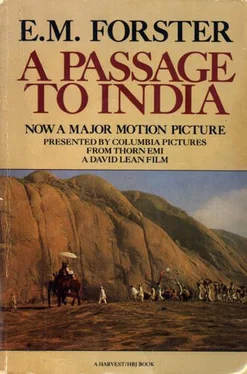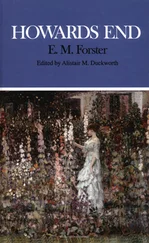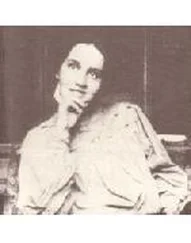Edward Forster - A Passage to India
Здесь есть возможность читать онлайн «Edward Forster - A Passage to India» весь текст электронной книги совершенно бесплатно (целиком полную версию без сокращений). В некоторых случаях можно слушать аудио, скачать через торрент в формате fb2 и присутствует краткое содержание. Город: San Diego, California, ISBN: , Издательство: Harcourt, Brace & World, Inc., Жанр: Классическая проза, на английском языке. Описание произведения, (предисловие) а так же отзывы посетителей доступны на портале библиотеки ЛибКат.
- Название:A Passage to India
- Автор:
- Издательство:Harcourt, Brace & World, Inc.
- Жанр:
- Год:неизвестен
- Город:San Diego, California
- ISBN:0-15-671142-7
- Рейтинг книги:5 / 5. Голосов: 1
-
Избранное:Добавить в избранное
- Отзывы:
-
Ваша оценка:
- 100
- 1
- 2
- 3
- 4
- 5
A Passage to India: краткое содержание, описание и аннотация
Предлагаем к чтению аннотацию, описание, краткое содержание или предисловие (зависит от того, что написал сам автор книги «A Passage to India»). Если вы не нашли необходимую информацию о книге — напишите в комментариях, мы постараемся отыскать её.
A Passage to India — читать онлайн бесплатно полную книгу (весь текст) целиком
Ниже представлен текст книги, разбитый по страницам. Система сохранения места последней прочитанной страницы, позволяет с удобством читать онлайн бесплатно книгу «A Passage to India», без необходимости каждый раз заново искать на чём Вы остановились. Поставьте закладку, и сможете в любой момент перейти на страницу, на которой закончили чтение.
Интервал:
Закладка:
His impulse to escape from the English was sound. They had frightened him permanently, and there are only two reactions against fright: to kick and scream on committees, or to retreat to a remote jungle, where the sahib seldom comes. His old lawyer friends wanted him to stop in British India and help agitate, and might have prevailed, but for the treachery of Fielding. The news had not surprised him in the least. A rift had opened between them after the trial when Cyril had not joined in his procession; those advocacies of the girl had increased it; then came the post-cards from Venice, so cold, so unfriendly that all agreed that something was wrong; and finally, after a silence, the expected letter from Hampstead. Mahmoud Ali was with him at the time. "Some news that will surprise you. I am to marry someone whom you know…" He did not read further. " Here it comes, answer for me—" and he threw it to Mahmoud Ali. Subsequent letters he destroyed unopened. It was the end of a foolish experiment. And though sometimes at the back of his mind he felt that Fielding had made sacrifices for him, it was now all confused with his genuine hatred of the English. "I am an Indian at last," he thought, standing motionless in the rain.
Life passed pleasantly, the climate was healthy so that the children could be with him all the year round, and he had married again—not exactly a marriage, but he liked to regard it as one—and he read his Persian, wrote his poetry, had his horse, and sometimes got some shikar while the good Hindus looked the other way. His poems were all on one topic—Oriental womanhood. "The purdah must go," was their burden, "otherwise we shall never be free." And he declared (fantastically) that India would not have been conquered if women as well as men had fought at Plassy. "But we do not show our women to the foreigner "—not explaining how this was to be managed, for he was writing a poem. Bulbuls and roses would still persist, the pathos of defeated Islam remained in his blood and could not be expelled by modernities. Illogical poems—like their writer. Yet they struck a true note: there cannot be a mother-land without new homes. In one poem—the only one funny old Godbole liked—he had skipped over the mother-land (whom he did not truly love) and gone straight to internationality. "Ah, that is bhakti; ah, my young friend, that is different and very good. Ah, India, who seems not to move, will go straight there while the other nations waste their time. May I translate this particular one into Hindi? In fact, it might be rendered into Sanskrit almost, it is so enlightened. Yes, of course, all your other poems are very good too. His Highness was saying to Colonel Maggs last time he came that we are proud of you "—simpering slightly.
Colonel Maggs was the Political Agent for the neighbourhood and Aziz' dejected opponent. The Criminal Investigation Department kept an eye on Aziz ever since the trial—they had nothing actionable against him, but Indians who have been unfortunate must be watched, and to the end of his life he remained under observation, thanks to Miss Quested's mistake. Colonel Maggs learnt with concern that a suspect was coming to Mau, and, adopting a playful manner, rallied the old Rajah for permitting a Moslem doctor to approach his sacred person. A few years ago, the Rajah would have taken the hint, for the Political Agent then had been a formidable figure, descending with all the thunders of Empire when it was most inconvenient, turning the polity inside out, requiring motor-cars and tiger-hunts, trees cut down that impeded the view from the Guest House, cows milked in his presence, and generally arrogating the control of internal affairs. But there had been a change of policy in high quarters. Local thunders were no longer endorsed, and the group of little states that composed the agency discovered this and began comparing notes with fruitful result. To see how much, or how little, Colonel Maggs would stand, became an agreeable game at Mau, which was played by all the departments of State. He had to stand the appointment of Dr. Aziz. The Rajah did not take the hint, but replied that Hindus were less exclusive than formerly, thanks to the enlightened commands of the Viceroy, and he felt it his duty to move with the times.
Yes, all had gone well hitherto, but now, when the rest of the state was plunged in its festival, he had a crisis of a very different sort. A note awaited him at his house. There was no doubt that Fielding had arrived overnight, nor much doubt that Godbole knew of his arrival, for the note was addressed to him, and he had read it before sending it on to Aziz, and had written in the margin, " Is not this delightful news, but unfortunately my religious duties prevent me from taking any action." Fielding announced that he had inspected Mudkul (Miss Derek's former preserve), that he had nearly been drowned at Deora, that he had reached Mau according to time-table, and hoped to remain there two days, studying the various educational innovations of his old friend. Nor had he come alone. His wife and her brother accompanied him. And then the note turned into the sort of note that always did arrive from the State Guest House. Wanting something. No eggs. Mosquito nets torn. When would they pay their respects to His Highness? Was it correct that a torchlight procession would take place? If so, might they view it? They didn't want to give trouble, but if they might stand in a balcony, or if they might go out in a boat… Aziz tore the note up. He had had enough of showing Miss Quested native life. Treacherous hideous harridan! Bad people altogether. He hoped to avoid them, though this might be difficult, for they would certainly be held up for several days at Mau. Down country, the floods were even worse, and the pale grey faces of lakes had appeared in the direction of the Asirgarh railway station.
CHAPTER XXXV
Long before he discovered Mau, another young Mohammedan had retired there—a saint. His mother said to him, "Free prisoners." So he took a sword and went up to the fort. He unlocked a door, and the prisoners streamed out and resumed their previous occupations, but the police were too much annoyed and cut off the young man's head. Ignoring its absence, lie made his way over the rocks that separate the fort and the town, killing policemen as he went, and he fell outside his mother's house, having accomplished her orders. Consequently there are two shrines to him to-day—that of the Head above, and that of the Body below—and they are worshipped by the few Mohammedans who live near, and by Hindus also. "There is no God but God"; that symmetrical injunction melts in the mild airs of Man; it belongs to pilgrimages and universities, not to feudalism and agriculture. When Aziz arrived, and found that even Islam was idolatrous, he grew scornful, and longed to purify the place, like Alamgir. But soon he didn't mind, like Akbar. After all, this saint had freed prisoners, and he himself had lain in prison. The Shrine of the Body lay in his own garden and produced a weekly crop of lamps and flowers, and when he saw them he recalled his sufferings. The Shrine of the Head made a nice short walk for the children. He was off duty the morning after the great pujah, and he told them to come. Jemila held his hand. Ahmed and Karim ran in front, arguing what the body looked like as it came staggering down, and whether they would have been frightened if they met it. He didn't want them to grow up superstitious, so he rebuked them, and they answered yes, father, for they were well brought up, but, like himself, they were impervious to argument, and after a polite pause they continued saying what their natures compelled them to say.
A slim, tall eight-sided building stood at the top of the slope, among some bushes. This was the Shrine of the Head. It had not been roofed, and was indeed merely a screen. Inside it crouched a humble dome, and inside that, visible through a grille, was a truncated gravestone, swathed in calico. The inner angles of the screen were cumbered with bees' nests, and a gentle shower of broken wings and other aerial oddments kept falling, and had strewn the damp pavement with their flue. Ahmed, apprized by Mohammed Latif of the character of the bee, said, "They will not hurt us, whose lives are chaste," and pushed boldly in; his sister was more cautious. From the shrine they went to a mosque, which, in size and design, resembled a fire-screen; the arcades of Chandrapore had shrunk to a flat piece of ornamental stucco, with protuberances at either end to suggest minarets. The funny little thing didn't even stand straight, for the rock on which it had been put was slipping down the hill. It, and the shrine, were a strange outcome of the protests of Arabia.
Читать дальшеИнтервал:
Закладка:
Похожие книги на «A Passage to India»
Представляем Вашему вниманию похожие книги на «A Passage to India» списком для выбора. Мы отобрали схожую по названию и смыслу литературу в надежде предоставить читателям больше вариантов отыскать новые, интересные, ещё непрочитанные произведения.
Обсуждение, отзывы о книге «A Passage to India» и просто собственные мнения читателей. Оставьте ваши комментарии, напишите, что Вы думаете о произведении, его смысле или главных героях. Укажите что конкретно понравилось, а что нет, и почему Вы так считаете.












